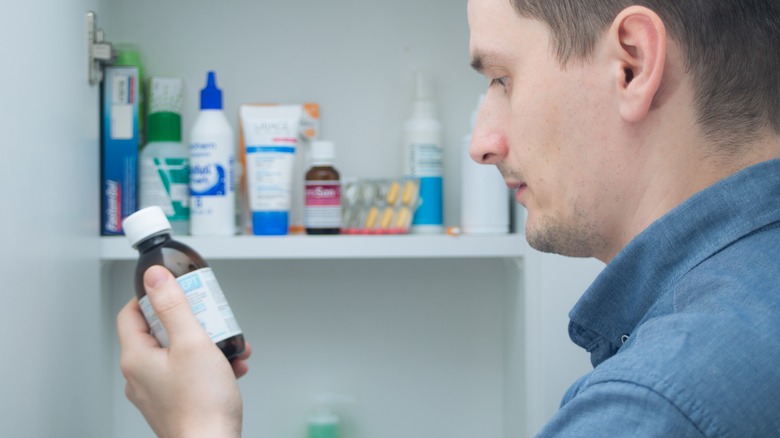What It Means When You're Craving Ibuprofen
Trigger warning: This article discusses drug addiction.
When you think about drug addiction, opioid medications are probably the first drugs to pop into your head. Therefore, you might not equate the craving you feel for ibuprofen with drug addiction. Additionally, Advil notes that ibuprofen is not habit-forming and doesn't have addictive properties like opioids. However, the type of addiction described by Advil is a narrow view of addiction.
According to the National Institute on Drug Abuse (NIDA), addiction is a chronic and relapsing disorder where the drug is compulsively sought and used despite any adverse consequences it might cause. They note this brain disorder incorporates reward, stress, and self-control areas of the brain, which is why addiction and addictive behavior continue after drug use has ceased. Given the definition of addiction, drugs that are thought to be non-addictive, like ibuprofen, can create addictive behaviors due to the rewards they create. This type of addiction is called process or behavioral addiction.Here are some of the different risks and consequences of ibuprofen addiction, and how to treat it.
If you or anyone you know needs help with addiction issues, help is available. Visit the Substance Abuse and Mental Health Services Administration website or contact SAMHSA's National Helpline at 1-800-662-HELP (4357).
Process addiction to ibuprofen and NSAIDs
The typical type of drug addiction is called substance addiction, where the drug itself is addictive. However, with ibuprofen, it's the feeling that it creates that's addictive. Ibuprofen is used to lessen pain and inflammation. Many times, people with chronic pain take ibuprofen regularly to improve their everyday functioning.
People continue to take ibuprofen because they want to be pain-free and worry that not taking the medication will make the pain come back. Addiction Hope notes that some individuals use ibuprofen to numb emotional pain as well as physical pain. So, they start to crave the medication when they don't take it daily or even several times a day.
Other symptoms of ibuprofen addiction include stashing ibuprofen around your home and purse to ensure you always have a bottle on hand and becoming angry or depressed when you don't have ibuprofen around you. Ibuprofen addicts also purchase large amounts of the drug so they don't go without it. FHE Health states that some people might try crushing or snorting ibuprofen to get it into their system quicker or mixing ibuprofen with other drugs to experience the effect.
Risks and consequences of ibuprofen addiction
Many people consider over-the-counter NSAIDs, like Advil, to be safe. For the most part, they are safe when used according to the directions. Those who become addicted go beyond the recommended dosage, which can cause harm. For example, NSAIDs can be hard on the stomach, especially when they are taken in high doses, which can cause ulcers. Additionally, Dignity Health notes that ringing in the ears, diarrhea, heartburn, nausea, and agitation are common side effects of large doses. It might also cause damage to the kidneys.
Addiction to NSAIDs can also lead to rebound headaches. According to Harvard Health, this type of headache happens when people with a headache disorder (e.g., migraine) overuse the medication. Therefore, you take the drug to get rid of the headache (or for fear of a headache), but taking it for more than a few days can cause a rebound headache. This creates a vicious cycle of taking the drug to stop the headache, only to get another headache.
Additionally, the Alcohol and Drug Foundation states that long-term use of the drug can lead to anemia from bleeding in the stomach. It might also cause impaired hearing and damage to your liver. Those using ibuprofen daily also have an increased risk of heart attack.
Ways to overcome ibuprofen addiction
Fortunately, therapies are available to help you cope with the symptoms of addiction. Per the NIDA, treatment with behavioral therapies is the most effective for behavioral addiction. These therapies are tailored to drug use patterns along with any underlying mental or social disorders that might exist. The FHE Health states that destroying the habit is vital to successful treatment. So, they recommend detoxing from the drug as the first step in the treatment process.
Afterward, a treatment plan will be put into place (per American Addiction Centers). During this phase, a professional and the individual work together to break the chain of addictive behavior based on their circumstances and situation. Depending on the level of the addiction behavior and its impact on your life, the treatment plan might include in-patient care with one-on-one counseling and group therapies.
As the treatment advances, loved ones' continued support is vital to recovery. Since addiction isn't a curable disease, maintenance therapy works to reinforce coping mechanisms and behavioral changes to limit the risk of relapse.




